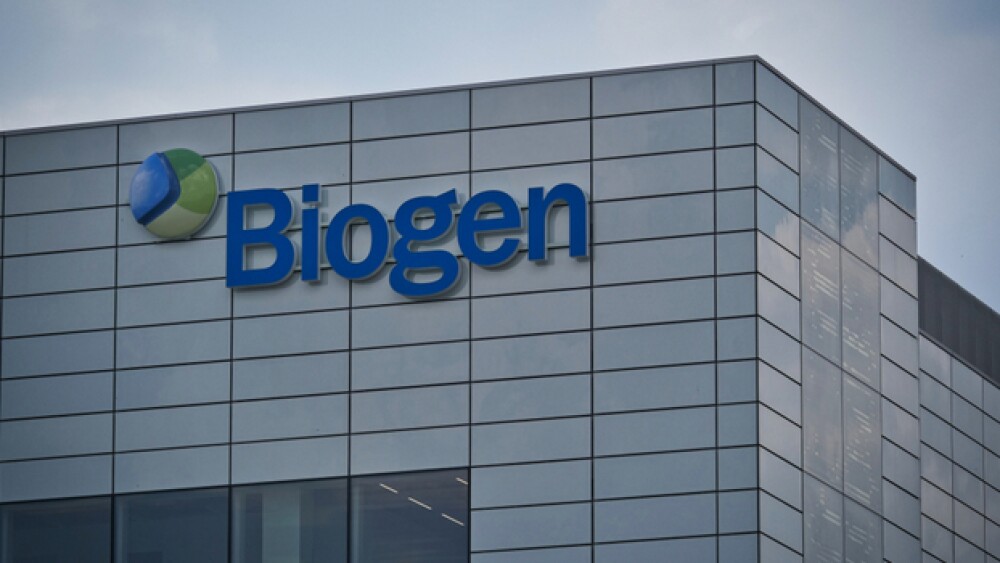Biogen, and partner Denali, are discontinuing the Phase III LIGHTHOUSE study of BIIB122 in Parkinson’s disease due to the trial’s long timeline and complexity.
Pictured: A Biogen building/courtesy of PictureDesignSwiss/shutterstock
Biogen is terminating the Phase III LIGHTHOUSE study of BIIB122, its Denali-partnered small molecule inhibitor of the LRRK2 enzyme, in Parkinson’s disease, the company announced Monday.
The decision to discontinue LIGHTHOUSE is due to the “study’s complexity including the long timeline,” according to the company’s news release. Biogen and Denali kicked off the late-stage trial in September 2022 and set an enrollment target of 400 Parkinson’s patients carrying pathogenic mutations in LRRK2. LIGHTHOUSE was scheduled to end in 2031.
Instead, the partners will focus on the Phase IIb LUMA study off BIIB122, which launched in May 2022 and is expected to enroll 640 early-stage Parkinson’s patients. Following LIGHTHOUSE’s discontinuation, the companies will adjust LUMA’s protocol to also include patients carrying LRRK2 mutations. Eligible patients in LIGHTHOUSE will be allowed to transfer to LUMA.
These pipeline adjustments will allow Biogen and Denali to reach a “timely readout on efficacy in early-stage idiopathic Parkinson’s disease,” the announcement stated, while also generating clinical data in patients with and without LRRK2 mutations.
LIGHTHOUSE’s discontinuation is not because of any safety or efficacy findings from any of BIIB122’s studies, according to the news release.
Biogen is developing BIIB122 in collaboration with California-based Denali under an August 2020 development and commercialization deal. For access to Denali’s small molecule LRRK2 inhibitors, Biogen paid more than $1 billion upfront—$560 million in cash and $465.4 million in equity—and pledged up to nearly $1.13 billion in potential milestones.
Biogen’s Pipeline Pivot
Monday’s modifications to Biogen’s Parkinson’s program come amid a broad pipeline reprioritization initiative.
In April 2023, during its first-quarter earnings call, Biogen announced it was eliminating glibenclamide IV, also known as BIIB093, which it was developing in partnership with Remedy Pharmaceuticals. The candidate was being assessed in a Phase III study of large hemispheric infarction and a Phase II trial for brain contusion.
At the time, Biogen also dropped its spinocerebellar ataxia Type 3 candidate BIIB132 and put on hold BIIB131, its investigational drug for acute ischemic stroke.
Biogen is also pulling back in the gene therapy space and is de-prioritizing some of its preclinical assets, Dan Haro, global media affairs lead at Biogen, told BioSpace in an email at the time of the company’s first-quarter report. In March 2023, Biogen scrapped its genome regulation partnership with Sangamo Therapeutics.
Arguably the biggest part of Biogen’s pipeline realignment, however, is its shift away from its multiple sclerosis (MS) business. In a fourth-quarter and full-year 2022 report, Biogen CEO Christopher Viehbacher said that while MS was still the company’s largest revenue stream, the company would still need to implement cost-reduction measures due to the “declining revenue base” of this business.
Viehbacher assumed Biogen’s top post in November 2022, following the departure of former CEO Michel Vounatsos, whose tenure was marred by the issues surrounding Aduhelm’s (aducanumab) approval and rocky launch.
Tristan Manalac is an independent science writer based in metro Manila, Philippines. He can be reached at tristan@tristanmanalac.com or tristan.manalac@biospace.com.






